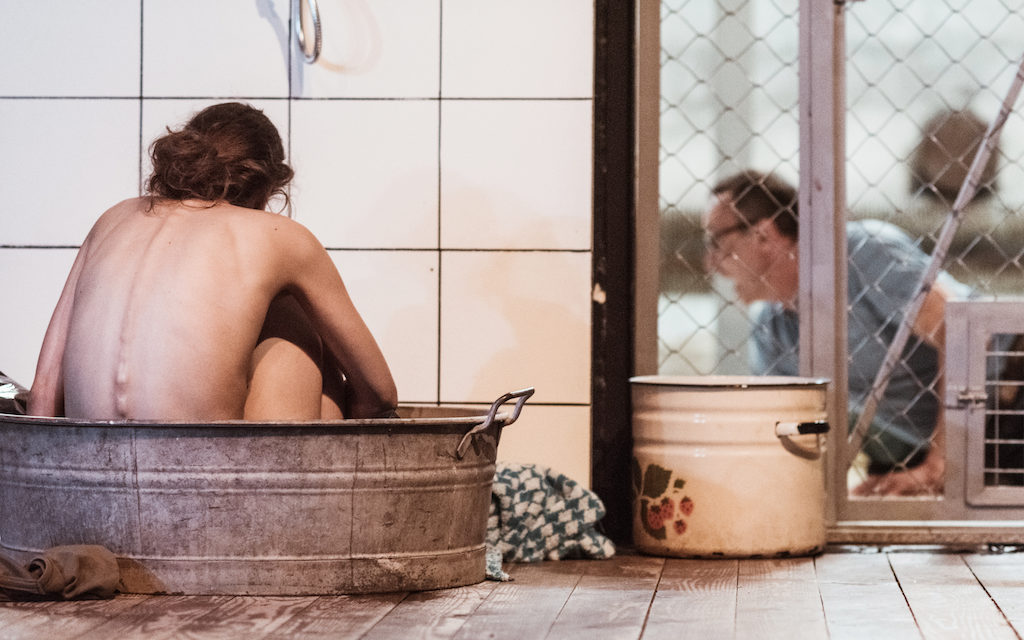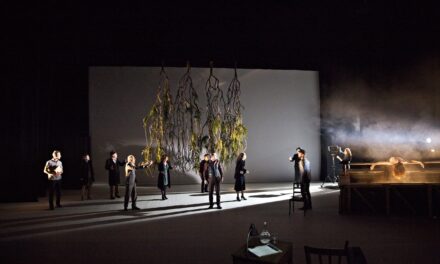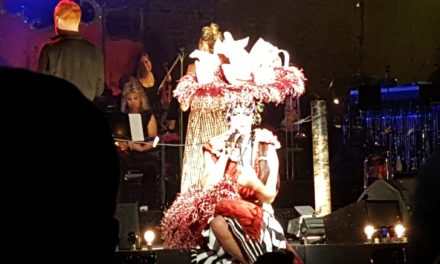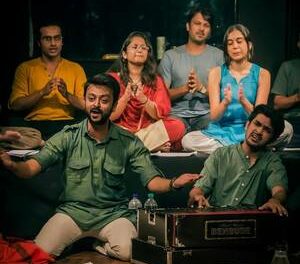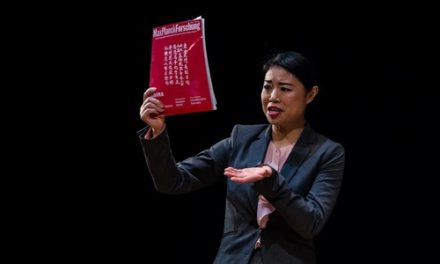Now in its 11th season, the Boska Komedia Festival is simultaneously a showcase for the most discussed Polish productions of the year, a platform for experimental and progressive work, and an opportunity for emerging voices to present their plays. This review is just one of many in The Theatre Times covering the 2018 Boska Komedia Festival. To read more reviews from the festival, click here.
Disgrace is a difficult play to watch. Partially, this stems from the tight direction of Marcin Wierzchowski and his keen ability to string horror and tension on stage. But this discomfort is also from problematic portrayals of women and people of color on stage. Disgrace is theatrically progressive but ultimately outdated.
Based on the 1999 Booker prize-winning novel by J. M. Coetzee (and adapted into a 2008 film with John Malkovich as its lead), Disgrace presents the Shakespearean fall of white Cape Town Professor, David Lurie, shortly after the end of Apartheid. It was one of the more plot-driven shows at Boska Komedia and one of the more naturalistic stories.
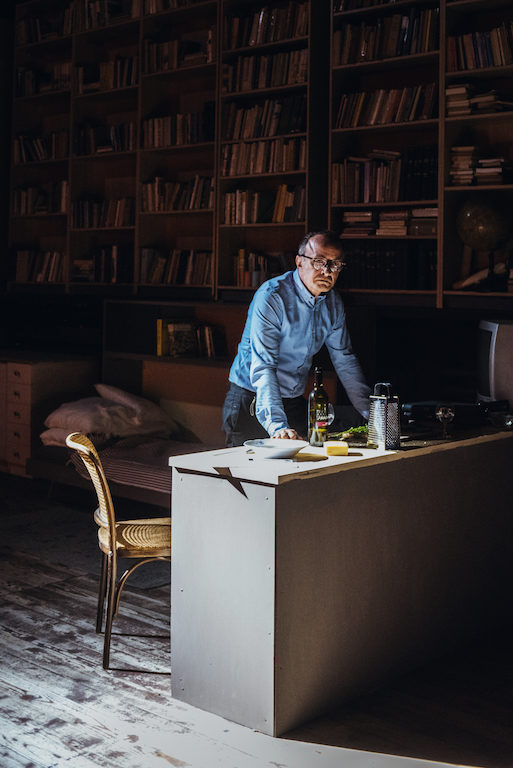
Disgrace directed by Marcin Wierzchowski. Presented at Teatr Ludowy—Scena Stolarnia for the 2018 Boska Komedia Festival. Photo Credit: Klaudyna Schubert.
After a series of illicit relations with his young female students, David Lurie is finally brought to a disciplinary board after his most recent fling, Melanie, reports him. Although Melanie takes the blame, Lurie refuses to submit a basic apology and leaves for the South African wilderness to live with his farm/dog kennel owning daughter, Lucy.
After becoming acquainted with rural life, two men come and attack the farm under the guise of asking for help. Lurie is beaten, locked in a kennel, and set on fire: all of which we see happen on stage. Offstage, Lucy is brutally raped. David frantically confronts his impotence in rectifying the situation as he slowly comes to understand his own past crimes.
Saving my commentary on the content for later, the direction and theatricality of this piece were magical, if not inconsistent. Even before you enter the theater, you are given an earpiece attached to a live radio that serves as David’s “inner voice” (there was even an English audio option). This created an intimate effect, certainly more than a loudspeaker could provide, and a means to connect with David’s inner workings. The radio even addresses “you” personally.
The beginning of the play offered a few more opportunities for audience involvement. Papers are handed out for an exam; an actor offers scent to folks to describe how a former lover smelled. Unfortunately, apart from the earpiece, those effects were quickly dropped; it would have been interesting seeing these moments continue in the piece.
Actors play dogs in Lucy’s kennel. Sometimes, the effect was deeply profound, most notably when an actor wearing a hood plays a struggling pup being euthanized. Other times, it was hokey, as when David’s disciplinary board erupts in barks and woofs.
Piotr Pilitowski as David must receive praise for his steadfast presence onstage during the 3-hour long play. Anna Pijanowska, however, was the true standout due to her nuanced and understated portrayal of his daughter Lucy, as particularly seen in her final speech to the audience. Otherwise, the acting in this naturalistic play was solid but ultimately secondary to plot and direction.
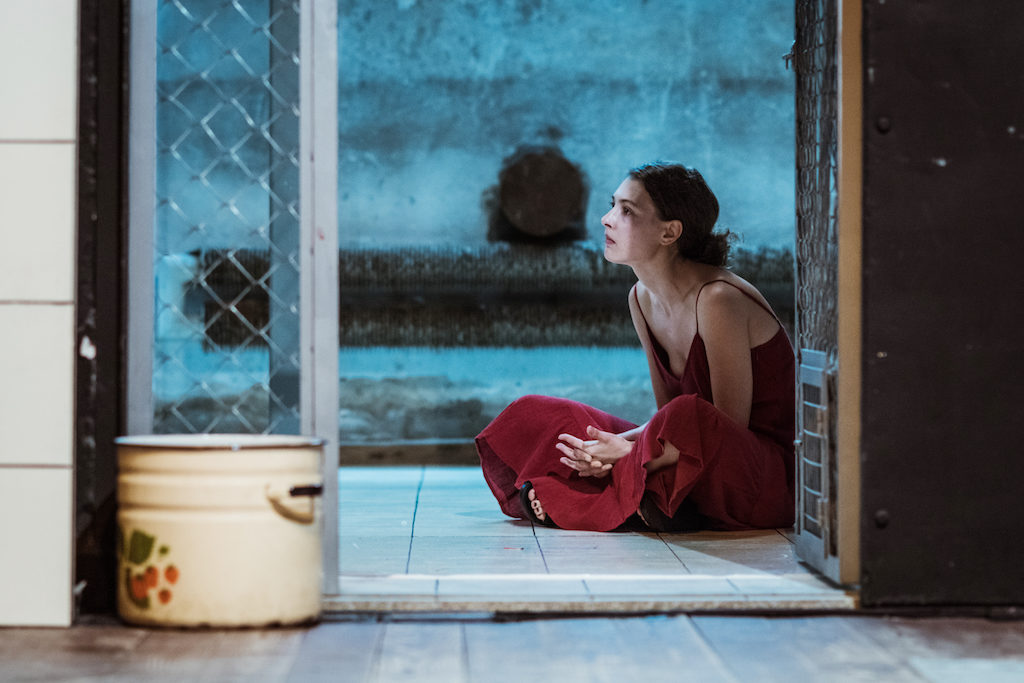
Disgrace directed by Marcin Wierzchowski. Presented at Teatr Ludowy—Scena Stolarnia for the 2018 Boska Komedia Festival. Photo Credit: Klaudyna Schubert.
Director Marcin Wierzchowski and set designer Barbara Ferlak make the small Ludowy Theatre space feel even more claustrophobic as they huddle their actors around desks, beds, showers. Semi-hidden in the back is a caged kennel and a meticulously organized veterinarian’s office. Looking over the main playing space, these spaces add a layer of danger and sickness to the already diseased set.
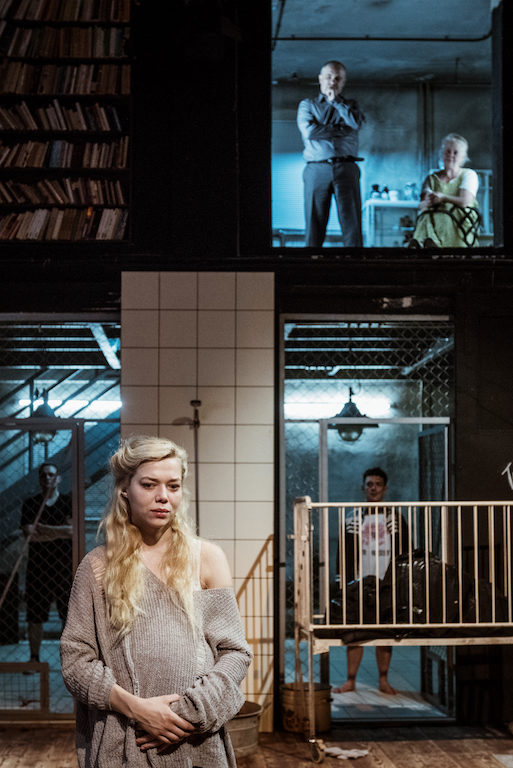
Disgrace directed by Marcin Wierzchowski. Presented at Teatr Ludowy—Scena Stolarnia for the 2018 Boska Komedia Festival. Photo Credit: Klaudyna Schubert.
Wierzchowski’s most effective scene comes near the end of the play in which the conceit of naturalism breaks down. In a Sarah Kane-esque moment, the countless books that lined the walls of the theater suddenly fall. Shortly after, men toss “bodies” of dogs in a bin, loud music plays, women speak, men stare, all while a story is being told via an earpiece. It was a truly frightening scene and I forgot to breathe until the moment passed.
In spite of Wierzchowski’s sharp looking direction, the actual content of the play is problematic.
Women are objects. Lucy’s rape serves as a vehicle for her father David’s emotional growth and even then, upon his return to Cape Town, David does not apologize to his former student Melanie, but to Melanie’s father. It is deeply disturbing as an audience member that Lucy marries her rapist and keeps the child, though she IS taking action rather than submitting to her father David’s demand she has an abortion. However, the play’s focus is on how Lucy is affecting David and not on Lucy herself.
At some point in the play, David and Lucy visit a party that features the actors performing a ‘traditional African dance’ while wearing ‘traditional African clothing.’ At this point, I realize that these white Poles were playing black Africans, that white Poles HAD been playing black Africans throughout the play, and that the two (white, Polish) men who attack and rape Lucy were also playing black African men.
I recognize that Coetzee’s book offers a metaphor for post-Apartheid South Africa with the attack on Lucy’s farm representing Africa fighting back its oppressors. However, in this play, because black Africans were being used as a thematic tool, the African characters were written as two-dimensional, dangerous, and as an almost animalistic force. While (thank God) there wasn’t literal blackface on stage, unlike in the not so distant Polish theatrical past seeing white actors portray simplified versions of black characters was entirely outdated for 2018 in an otherwise progressive forward-looking theater festival.
It’s too bad because Wierzchowski’s work was interesting, fascinating, and mostly effective; there was a reason why this play was sold out. I am interested in seeing Wierzchowski’s other work, but the content places it in the past, instead of reaching out to say something new.
This special report from the 2018 Divine Comedy Festival in Poland was sponsored by the Adam Mickiewicz Institute and Emerson College. To read more reviews from the festival, click here.
This post was written by the author in their personal capacity.The opinions expressed in this article are the author’s own and do not reflect the view of The Theatre Times, their staff or collaborators.
This post was written by Rem Myers.
The views expressed here belong to the author and do not necessarily reflect our views and opinions.

